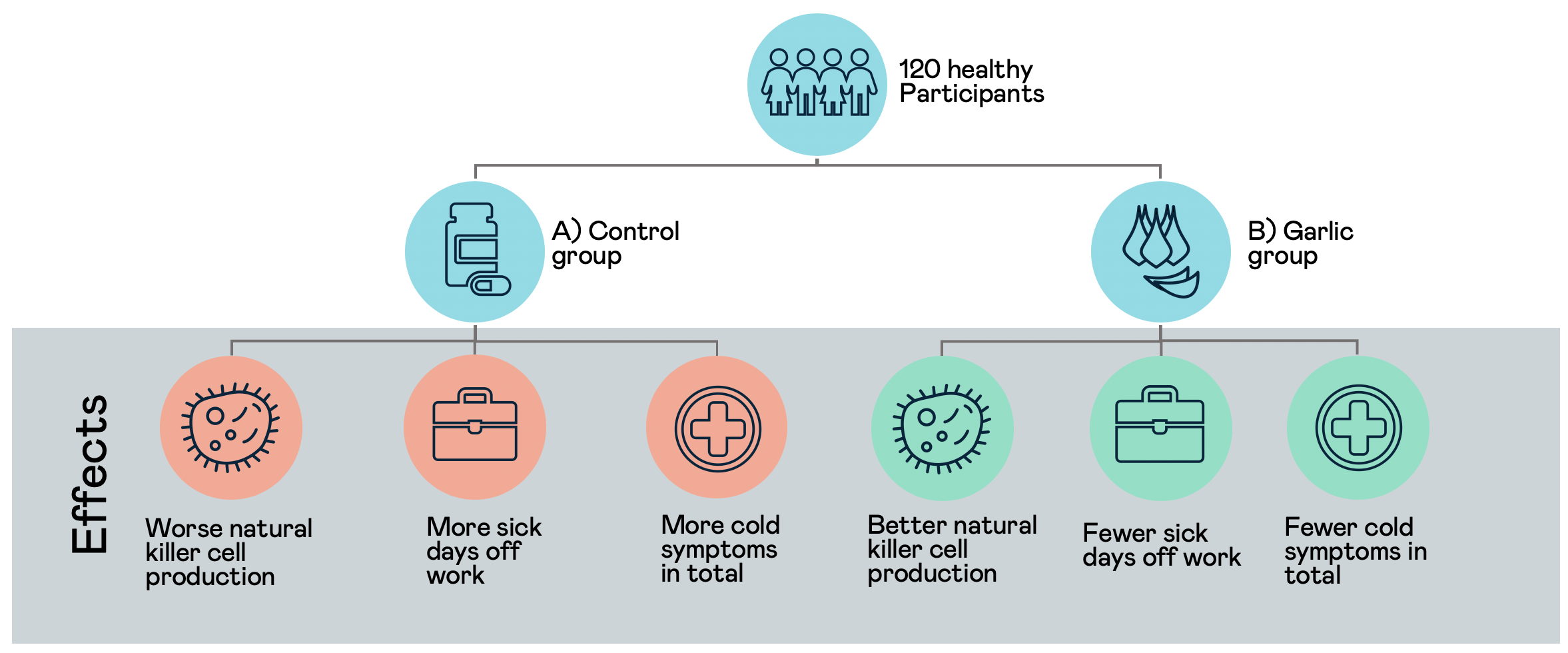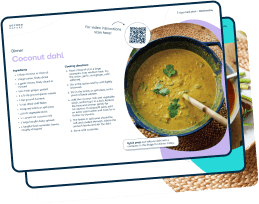In the current environment, it’s incredibly important that we look after our immune systems. One of the best ways we can do so is eating a varied, balanced diet. Viruses or infections travel from person to person, usually as a result of direct contact or airborne transmission.
Between busy commutes, offices, and schools, the chances of coming into contact with such viruses or bacteria are high. It’s important to provide our bodies with the necessary nutrients to fight viruses, seasonal flus, and colds.
The main thing to bear in mind is that providing our bodies with a variety of vitamins and minerals, sleeping well, exercising regularly, and managing our stress levels are all important factors to keep our immune system strong.
Other than chicken soup, there are particular vitamins and foods that are considered helpful for illness and immunity. This guide will go through the evidence behind these foods and vitamins to determine the best dietary choices to keep our immune system strong.
Medication-assisted weight loss with a future focus
Start with Wegovy or Mounjaro, transition to habit-based health with our support


Vitamin C
Vitamin C is present in a large number of foods. Specific foods that contain a high amount of vitamin C include:
- Tomatoes
- Broccoli
- Peppers
- Citrus fruits (e.g. oranges or lemons)
- Kiwis
- Leafy green vegetables (e.g. spinach or kale)
The evidence is uncertain as to whether or not a vitamin C supplement would help to prevent illness. We should be able to get adequate amounts of vitamin C by eating a variety of fruits and vegetables, so taking an additional supplement would only be beneficial if the evidence suggested very high doses help our immunity.
A large number of animal studies show that vitamin C might help to reduce or prevent viruses and infections. However, studies in humans are less conclusive.
A review published in the Cochrane Database of Systematic Reviews examined a large number of human studies. All the studies included were placebo-controlled, which mean it’s less likely the effects are due to anything other than vitamin C.
This review concluded that if we’re already ill, taking vitamin C doesn’t have much of an effect. Some evidence in its early stages suggests that very high doses of vitamin C may reduce the length of time illness lasts, but more studies are needed to confirm this.
Looking at people who take vitamin C supplements regularly, the review concluded that regular supplementation might reduce the length of time and severity of cold-like symptoms. However, the evidence was mixed.
Some of the trials included didn’t account for differences in the diet of participants during the trial. This is important because someone might be eating a healthy diet with plenty of vitamin C and the supplement might take them to a high daily dose, whereas others might not be getting much from their diet. The review suggested that no strong conclusions can be drawn about supplementing regularly with vitamin C but given the safety and low cost of vitamin C, a supplement can’t hurt.
Those of us who appear to benefit from high doses of vitamin C in this review are athletes or individuals who do regular high-intensity exercise. Evidence suggests that athletes that take a vitamin C supplement are almost half as likely to experience cold-like symptoms as athletes who don’t. This seems more reasonable as you are comparing like with like, and all athletes are likely to be health-conscious people. One potential reason for this is that athletes suffer from exercise-induced bronchoconstriction (EIB). The researchers suggested that vitamin C could be preventing this particular condition, rather than a viral or bacterial infection that normal people experience.
Key points:
- Having extra vitamin C when you’re already ill doesn’t have much of an effect.
- Some evidence suggests that regular supplementation might reduce the length of time and severity of illness.
- Research suggests that athletes benefit from a high dose of vitamin C.
- Plenty of foods contain vitamin C, so eating a balanced, varied diet is important and should provide the average person with enough.
Garlic
Garlic is known as a ‘natural antibiotic’ and used in many herbal remedies to boost the immune system. But what does the evidence say?
A recent 12-week study split 146 participants into a treatment group, where they received daily garlic supplements, and a control group, where they received a placebo pill.
The group taking the garlic supplement had significantly fewer colds than the placebo group. Plus, the placebo group experienced symptoms that lasted significantly longer than the garlic group. This suggests that garlic might reduce the duration and severity of colds.
However, although this evidence is promising, the 12-week trial wasn’t carried out in a controlled environment. Participants were free to live how they usually do, which means the results were dependent on self-reporting of cold symptoms. Self-reporting is notably unreliable, for example, in this study people might have different subjective opinions of how well they were feeling. Randomised controlled trials are more reliable when objective measurements (called ‘hard endpoints’ in the science world) are used to determine results, such as physical indicators of illness.
One trial explored the effect of garlic on the immune system and included more objective measures in the results. 120 healthy individuals were divided into 2 groups, a) the control group, who received a placebo supplement or b) the garlic group, who received a garlic supplement for 90 days.

The garlic group (b) showed significantly better production of natural killer cells compared with the control group (a). Natural killer cells are like immune assassins that appear in our bodies every day and help fight infection. This is a more objective point to measure.
The number of illnesses during the 90-day period wasn’t significantly different between groups, however, the number of symptoms recorded during the trial was significantly less for group b). This suggests that the flu and colds experienced were less severe, as fewer symptoms were reported in group b).
On top of this, the number of sick days individuals took off work was significantly less in group b). Although more evidence is needed, these findings suggest that having roughly 2.5g/day of garlic (the equivalent of 1 clove) might boost our immune systems and reduce the severity of symptoms when we do catch viruses or infections.
Before cooking fresh garlic make sure that you crush, slice, or finely chop it, as this releases a chemical substance called allicin. Allicin is responsible for the strong smell of garlic and also for its health benefits.
Key points:
- Recent evidence suggests that garlic having roughly 2.5g/day of garlic (the equivalent of 1 clove) might reduce the severity and length of time of colds.
- Crushing, slicing, or finely chopping garlic before we cook it releases most allicin (the substance responsible for its health benefits).
Vitamin D
Vitamin D is involved in a number of different processes in the body, including the regulation of our immune system. Apart from oily fish, such as salmon or mackerel, natural foods contain little vitamin D.
During the summer months, our main source of vitamin D is from the natural action of sunlight on our skin. During winter, however, vitamin D should be sourced from dietary supplements.
Test tube experiments (in vitro) suggest that vitamin D can regulate immune cells when infections are present. However, this doesn’t tell us much about the effect of vitamin D in the human body.
Research suggests that the D3 form of vitamin D is more effective than D2 for raising and maintaining blood levels of vitamin D in humans. One high-quality trial investigated the effect of vitamin D3 supplementation on the occurrence of flu in school children.
The findings suggest that supplementation of vitamin D3 reduces the occurrence of flu in children. This effect was stronger in children who hadn’t been taking any vitamin D supplements previously. This suggests that rather than high levels of vitamin D being beneficial, a deficiency puts us at a greater risk.
Interestingly, a different study in children demonstrated that there was no significant difference in the occurrence of respiratory infections (e.g. bronchitis) between the low and high vitamin D3 group. This supports the idea that a vitamin D deficiency makes our immune system more susceptible to infections, but higher levels of vitamin D3 don’t further reduce the risk of infections.
Although these studies are promising, further clinical research in adult humans is necessary to determine the direct impact of vitamin D on the immune system.
An indirect benefit of vitamin D on our immune system might be that it helps us sleep better. A clinical trial demonstrated that supplementing adult individuals who had sleep disorders with vitamin D significantly increased the quality of their sleep.
The potential mechanism is that vitamin D receptors are present in numerous areas of the brain known to play a role in sleep regulation. Hence, supplementing vitamin D might help with sleep regulation. If we regularly sleep well, our immune system will benefit.
Overall, a daily 2,000 IU vitamin D3 supplement appears to be safe and effective for the average, healthy adult. If you’re pregnant or have any health conditions, we recommend discussing this with your GP first.
Key points:
- Evidence suggests that we need vitamin D to regulate our immune system, but higher levels don’t necessarily further reduce the risk of colds.
- There is strong data supporting the indirect effect of vitamin D improving sleep.
- In winter months, we should take a vitamin D3 supplement as few natural foods contain it.
Zinc
Zinc is an essential mineral that is required for many different functions of the immune system. Zinc promotes the growth and development of white blood cells and natural killer cells.
Many foods contain zinc. Specific foods with high zinc content include:
- Oysters
- Crab
- Red meat
- Chicken
- Lentils
- Chickpeas
- Beans
- Seeds
It’s worth noting that lentils, chickpeas, and beans also contain phytates, which reduce the bioavailability of zinc. This means that not all the zinc we eat from these plant foods will be absorbed in our bodies. Despite this, they are still good sources of zinc for vegan or vegetarian individuals.
Many animal studies show that zinc deficiency decreases our resistance to a range of bacterial, viral, and fungal germs. However, this doesn’t tell us the impact of zinc on human immune systems.
A placebo-controlled clinical trial explored the effect of zinc supplementation in elderly individuals for 1 year. The supplement was 15mg, which is the equivalent to eating 3 oysters. Results demonstrated that the group supplemented with zinc experienced significantly fewer infections in the 12 month period compared with the placebo group.
However, at the start of the trial, roughly 35% of the elderly individuals were zinc-deficient. Arguably, zinc supplementation improved the immune function of those who were deficient to begin with, which may have influenced the overall effect.
Overall, it seems like the research suggests that being zinc-deficient can reduce the ability of our immune systems to fight viruses and infections. However, if we’re eating a healthy balanced diet, a zinc supplement isn’t necessary. Plus, too much zinc can cause negative side effects, such as nausea, vomiting, loss of appetite, and stomach cramps. The upper limit of zinc considered to reduce the risk of side effects is 40mg/day.
Key points:
- Zinc deficiency reduces the ability of our immune systems to fight viruses and infections.
- Eating more zinc than we need doesn’t lead to bigger benefits and too much zinc can have negative side effects.
- Eating a balanced, varied diet should provide enough zinc to support most people’s immune system.
- Plant sources of zinc are absorbed less in our body compared with animal sources.
Ginger
Ginger has been used in herbal remedies for a long time, particularly in traditional Chinese medicine practices. Ginger tea is often recommended for sore throats. Many curries, like our coconut dahl, and stir fries, such as our beef and broccoli stir fry, contain ginger.
The clinical evidence for the effect of ginger in preventing viruses or infections is extremely limited. One test-tube study (in vitro) demonstrated that ginger extract slowed down the growth of bacteria associated with sore throats.
Other test-tube studies similarly suggest that ginger may have antiviral and antibacterial properties. However, good quality clinical evidence in humans is almost non-existent. This doesn’t mean that ginger isn’t effective in helping our immune system, but rather that more evidence is necessary to come to that conclusion.
There is, however, a reasonable amount of evidence suggesting that ginger reduces feelings of nausea. This evidence suggests ginger was at least as effective as drugs used to treat nausea, if not more. So, ginger may be helpful if you experience an upset stomach and nausea.
Key points:
- The evidence exploring the effect of ginger on colds and the flu is very limited.
- Test-tube studies suggest that ginger may slow down the growth of certain bacteria.
- There is more evidence suggesting ginger may reduce nausea symptoms.
Take home message
- Eating a varied, balanced diet should provide you with most of the nutrients your immune system needs.
- High amounts of vitamin C may reduce the length of time and severity of cold-like symptoms, but further evidence is needed.
- Eating foods high in vitamin C is a good idea regardless, and vitamin C supplements are safe and cheap if you think you’re not getting enough from your diet.
- The strongest evidence is for garlic boosting the immune system, by increasing natural killer cells (‘immune assassins’).
- Adding roughly 1-2 cloves/day of crushed/sliced garlic to your cooking should be enough to see these effects.
- Vitamin D is needed to regulate our immune system and may also improve our sleep.
- In the winter months, a vitamin D3 supplement should be taken.
- A zinc deficiency can weaken our immune system, but more zinc than we need won’t further benefit our immune system.
- Evidence on the effect of ginger for colds and flu is very limited, but more evidence exists suggested ginger reduces nausea.


